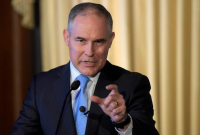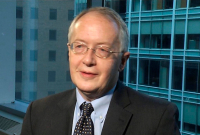Support strong Canadian climate journalism for 2025
U.S. President Donald Trump's climate change denial is a welcome opportunity to debate the science of human-caused global warming, former federal Conservative minister Joe Oliver said in a Financial Post op-ed on Thursday.
“You will not have heard about this in most of the mainstream media,” Oliver’s op-ed in the Financial Post on Thursday begins.
In the column, the former natural resources minister asserts what he describes as “some unconventional facts” about climate change: that “there is very little we can do” about it and that even trying to meet the goals of the Paris climate agreement “would be a Herculean and prohibitively costly effort.”
Oliver was minister of natural resources from 2011 to 2015 under former prime minister Stephen Harper, and briefly served as Minister of Finance from 2014 to 2015. He also ran unsuccessfully for the Ontario Progressive Conservative nomination in York Centre last year.
Oliver told National Observer in an interview that he was not suggesting that humans stop trying to reduce our climate footprint. “Obviously, it would be better if there wasn’t a problem (with climate change). But if there is a problem, then we have an obligation to deal with it,” he said.
In the Financial Post op-ed, Oliver describes as “plausible” the theory that “the left is using the global-warming scare to engineer a massive government incursion in the economy.”
Debate over threat of climate change is overdue, Oliver says
Oliver cites climate-change denier William Happer, a Princeton physicist who is reported to be one of Trump’s top picks for science advisor. Happer has argued that climate change is “due mostly to natural causes” and will benefit humans by encouraging plant growth.
Oliver said that he understood the vast majority of climate scientists agree that humans are causing climate change and are calling for immediate action.
“Being a non-scientist, what gives me pause is the fact that there are other scientists – in the minority, I grant you – who don’t agree,” Oliver said. He said he intended for the piece to encourage debate about human-caused climate change.
“Clearly there are differences among scientists. A majority – you might even say the vast majority – are concerned or alarmed about this issue, and think that we have to deal with it immediately and decisively, because the alternative would be devastating for the planet. There’s a smaller group that is skeptical and think that trillions of dollars globally will be wasted,” Oliver said.
“I think it’s healthy in a democracy for us to hear all the views, and no one should be concerned about that,” he said. In the newspaper column, he writes that Trump’s denial of the scientific consensus on human-caused climate change presents an opportunity for that discussion.
“Since the Trump administration is skeptical of the settled orthodoxy, we may soon be exposed to different views of the issue,” Oliver writes. “That could lead to an open discussion about whether climate change is really the threat we’ve been led to believe. It’s long overdue."
Debate over threat of climate change is over, scientists say
Atmospheric physicist James Drummond is one of those scientists in the vast majority. He holds the Canada Research Chair in Remote Sounding of Atmospheres, is a faculty member at Dalhousie University and the University of Toronto and is working on projects funded by the Canadian government and NASA to measure and map pollution and ozone levels around the globe.
“The idea that the climate can change due to increasing CO2 is…Well, we teach it in second year physics classes,” Drummond told National Observer.
Drummond was also one of a dozen leading scientists who wrote in 2013 to Oliver, who was at the time minister of natural resources in the Stephen Harper government, expressing concern about comments Oliver had reportedly made to La Presse that appeared to question the need to take urgent action on climate change. In the letter, the scientists offered Oliver a “full briefing” on current climate change science.
Oliver said he didn’t recall taking them up on the offer, although he said he did meet with other climate scientists.
Drummond told National Observer that it’s frustrating to go over the same ground. “The basic ideas of temperature rise and so on are there, and not going to go away, ever. It’s basic physics,” he said.
“The theory has been around now for about 150 years. This is no new theory,” Drummond explained. The discussion at this point needs to be about how to best respond to climate change reality, he said.
"I think there are some things that are not worth debating anymore. We don’t debate the existence of gravity … Similarly, we shouldn’t be debating the existence of the greenhouse effect," Concordia professor Damon Matthews told National Observer. Matthews, the university's research chair in climate science and sustainability, also signed the 2013 open letter offering Oliver a climate science primer.
"We have to throw out the entire argument," he said, and move on to other discussions, like the merits of a cap-and-trade system as compared to a carbon tax, or the temperature threshold for dangerous climate change. The science is clear at this point, and the idea of a debate about climate change science is just a smokescreen, he argued.
“What people are doing is pretending that the debate is about the science, when really the debate is about ideology, and how we should be dealing with how humans are affecting the environment," Matthews said.
Oliver refers to a climate change hiatus that was discredited
Speaking with National Observer, Oliver brought up the theory of the climate change hiatus – a discredited idea that stems in part from a 2013 Intergovernmental Panel on Climate Change report that appeared to show that ocean surface temperatures had stopped increasing. Newer research suggests that there was no hiatus, and that warming water was distributed below the ocean's surface, making it appear that warming was not happening as quickly as expected when in fact it was. Errors in temperature data – the result of less accurate methods of measuring ocean temperature being replaced by newer, more accurate methods – may have also contributed to the appearance of a plateau.
“The mainstream press conveys facts that are consistent with their prevailing view,” Oliver said. “You have this crazy situation where if you have an unusually warm month, we hear all about it, but if we have an unusually cold month, we hear nothing about it. What’s that about?” he asked.
But temperature fluctuates over time – one warm or cold month doesn’t say anything about the overall climate, Drummond explained. “One swallow does not make the summer,” he said. “You have to look at the long-term, because climate is long-term.”
The long-term trend is clear: the average temperature on Earth has increased by about one degree Celsius since the late 19th century.
Last year was the hottest year on record, and, with one exception, every year since 2001 has been the hottest ever.
"I would say the onus is on the people who say that it’s not happening to explain why the physics doesn’t work, because it’s very sound,” Drummond said.
There is no economic argument against taking action on climate change, climate policy analyst Mark Jaccard said in an interview. He is a Simon Fraser University professor and Royal Society of Canada fellow who was also a signatory to the 2013 open letter.
There’s a clear consensus among economists and technologists researching that problem, he said: by 2050, the global economy will lose the equivalent of about one year of economic growth by sticking to the most recent greenhouse gas reduction targets.
But that cost will be far outweighed by the benefit of avoiding or minimizing a host of climate-change-related problems – like the spread of the mountain pine beetle in Western Canada. Research from Natural Resources Canada shows that the beetle, which as of this year is estimated to have destroyed at least 58 per cent of all marketable pine wood in B.C., will spread further as summers stretch longer and winters become less intense.
“Basically, you lose a year of economic growth and you save probably 10 years of economic growth costs – in other words the benefit-cost ratio is highly positive,” Jaccard said.
“I don’t go into my doctors office and say ‘Look, I know that you and 999 out of 1,000 doctors think that I have cancer, but I’m going to decide that I don’t have cancer."






Comments
Hound them with scientific questions, that's all.
These "scientists" who disagree: may we please have names along with the date of their last successful submission to a peer-reviewed journal of climatology, geology, or hydrodynamics?
Reporters let these guys get away with rhetorical gibberish because they themselves are usually free of any science degrees.
Jonathan Kay is a serious conservative and good friend of Conrad Black. His mostly-good book on conspiracy theorists sadly omitted any criticism of deniers and their conspiracy theories about climate change. But when forced to address the issue, he stands foursquare against deniers as liabilities to conservatism:
http://news.nationalpost.com/full-comment/bad-science-global-warming-de…
How can this man be? Jonathan Kay has a master's degree in metallurgy. This has little to do with climate, but it's really hard to get a master's an not understand the vast difference between somebody who's read a few articles and somebody who's spent a decade of long hard days studying science and trying to get published in a peer-reviewed journal. When people who've worked way longer at climatology than Jonathan Kay spent studying metallurgy, he knows he should respect their years of work and wisdom gained. He doesn't fasten on a few "scientists" with little or no publishing history or years of work on that specific science as their equals to be balanced against.
Reporters, alas, generally do buy that argument, out of their own scientific ignorance.
It's time for the National Observer to hire somebody with an advanced degree in science to cover this issue, and ask politicians the hard questions.
All I have to say is that Joe Oliver is not the brightest in the pack